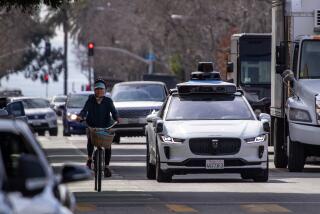Legality of Cracked Windshield in Eye of the Beholder
- Share via
Dear Street Smart:
While driving on the freeway a small rock was kicked up by a truck in front of me and cracked my windshield.
Since I cannot at this time afford to have my windshield replaced, could you please tell me if it is legal to drive around with a cracked one?
Also, is the truck that kicked up the rock in front of me liable for breaking my windshield?
Dee Dee Gold
Costa Mesa
In this state, the beauty of a windshield is truly in the eye of the beholder. And let’s hope the beholder won’t be a California Highway Patrol officer in a squad car with the red lights flashing.
Confused? Let’s let Sam Haynes, a CHP spokesman in Sacramento, take a crack at explaining.
As Haynes tells it, the state vehicular code is a bit muddled on the issue of whether one can legally drive with a cracked windshield. The code does not address cracks directly, but states that a car, truck or van must be equipped with an “adequate” windshield that does not impair vision or present a danger to an occupant.
“It just isn’t black and white,” Haynes said. A small crack might not present a danger or impair vision, but a larger one could prompt a law officer to pull you over and write a ticket. While you might be able to convince a judge of the error of the officer’s ways, such an episode would certainly sully any motorist’s mood for a good many commutes.
Getting money from the driver of the offending truck to repair your windshield is equally problematic.
Haynes recommends that you first try the optimistic approach--presenting a claim for the windshield damage to the trucking company. You also have every right to take the driver to small claims court, but the task of proving his truck actually kicked up the rock could prove difficult.
As an aside, our roads may soon become a bit less rocky. Much of the problem with our pebble-strewn roads could be cleaned up after a new state law takes effect Sept. 1 requiring gravel trucks to throw a tarp over trailers containing loose material that can bounce all over the road like popcorn.
Dear Street Smart:
You have done your readers a disservice by suggesting in your July 30 column that big cars are safer than small cars. The analysis you referred to had to do with repair costs.
Consider this: The repair cost of a damaged fender and door of a Yugo could be higher than the market value of the automobile itself. By insurance industry definition, this makes the vehicle a total loss. The same damage, and same repair cost on a larger “Detroit Iron” would not exceed the vehicle’s value and would therefore be repaired.
In other words, a vehicle that is initially more expensive, and those that hold resale value better, would be less likely to be declared a “total loss” by the insurance industry under identical circumstances.
Safety is a totally different issue. Please re-examine the report and comment on the bodily injury, loss of life, and medical cost aspects of automobile accidents as related to vehicle size.
Thomas J. Hartung
Corona
You make a worthy point. But other studies support the idea that small cars are more dangerous in accidents than larger vehicles.
A study just completed by the National Highway Traffic Safety Administration in Washington reports that the fatality rate among occupants of small cars is double that of large cars. The study found that there were 252 fatalities per 1 million registered small cars versus 122 fatalities for every 1 million large automobiles.
Vans actually had the least number of fatalities per vehicle, with 133 deaths for each 1 million vehicles. That’s a somewhat surprising statistic given that many vans lack much front-end protection to ward off devastation during head-on impacts.
Small pickups, on the other hand, had the highest fatality rate, with 282 for each 1 million trucks.
Unfortunately, the report did not have statistics on bodily injury and medical costs, but I suspect those may fall in line with the general thesis that a small car just doesn’t offer the protection in an accident that a large one does.
Don’t take all this to mean that this correspondent is down on small cars. They are nimble, sprightly vehicles that are far easier to drive in the tight quarters of today’s crowded roads. To top it off, they don’t guzzle gas, a real plus in these days of rising oil prices and conflict in the Middle East.
More to Read
Sign up for Essential California
The most important California stories and recommendations in your inbox every morning.
You may occasionally receive promotional content from the Los Angeles Times.













